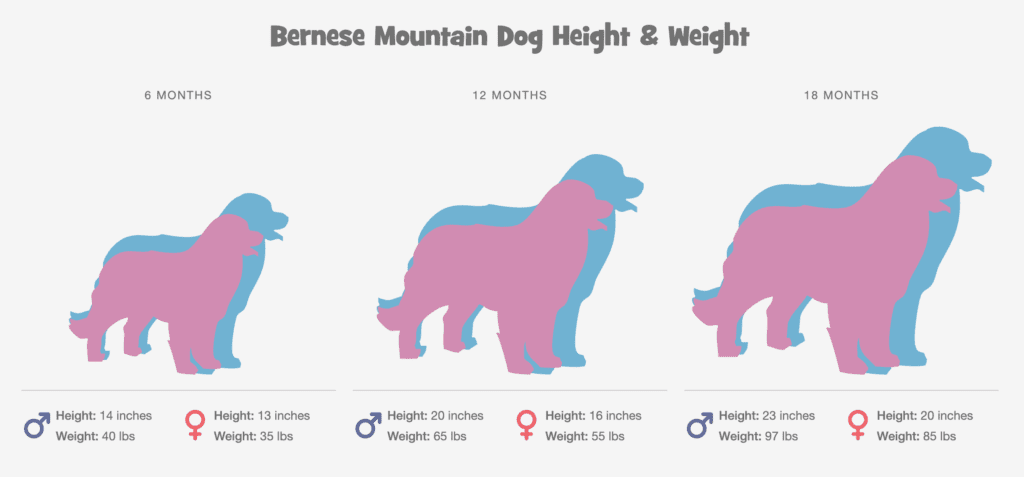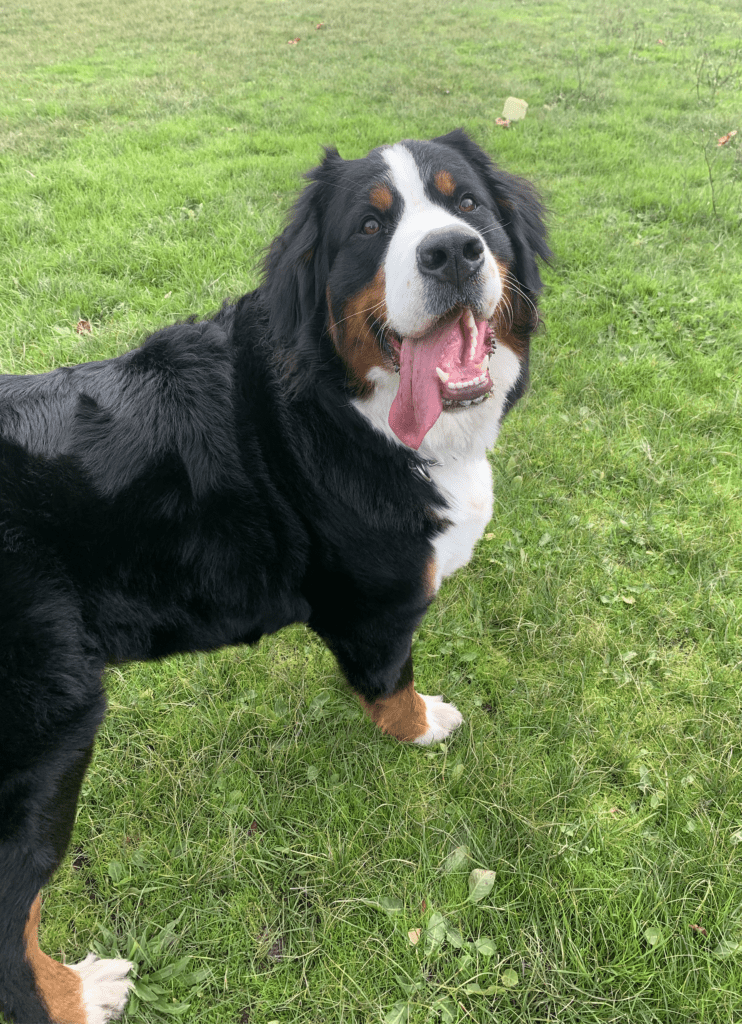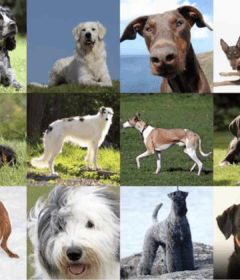Berner Puppy Growth Guide

The Swiss saying, “Three years a puppy, three years a good dog, three years an old dog and the rest is a gift”.


BERNESE PUPPY GROWTH GUIDE, 8 – 10 WEEKS
Typical Bernese pups may weigh anywhere from 12 – 24 pounds at 8 – 10 weeks. Puppy weight at this young age is sometimes a refection of litter size, with large litters tending to have smaller puppies and litters with fewer members having larger sized pups – more of mom to go around and less competition at the bowl. The size and weight of a Berner puppy may be correlated to the dam or sire (mother and father).
It is not uncommon to see a wide range of sizes and builds in pups produced by any breeding pair – a large sire does not guarantee that all of its offspring will grow up to be big dogs. The same can be said for the size and shape of Bernese pups produced by any given dam. And, the relative size of a puppy may or may not carry through to adulthood – just because it was a large puppy does not necessarily mean it will be a large adult dog. Sometimes the smallest pup at 10-14 weeks turns into a large dog. Typically puppies will gain somewhere between 2-4 pounds a week up to the first 6 months.
Feeding more food to accelerate growth is not advised. The only thing overfeeding a Berner puppy will do is to place increased strain on joints, ligaments, tendons and bones, not to mention a possibility of bloat. The final size of any dog was set at the time the sperm hit the egg and there should not be any human attempts to distort destiny. The key is to manage exercise and feeding to allow for steady, consistent growth.
What to look for in young Bernese Mountain Dog puppies is substance, a full body with a broad flat back and good top-line, nice proportions and adequate heaviness of bone in the legs , a pleasant head with broad back-skull, good scissors bite and good detail in ear placement and tight eyes and flews. A good balance in gait with the capability to sustain a slow trot is an excellent indicator that a puppy’s structure will likely be adequate .

BERNESE PUPPY GROWTH GUIDE, 10 – 16 WEEKS
Weeks 10 – 16 are continued growth weeks for Berner puppies. The weight of Berner pups are typically in the range of 24 – 45 pounds. Often Bernese puppies that appeared short and stocky at an earlier age start to put on length of leg. In general, Berner pups will gain height and have a less bulky body. Pups should be house trained – make sure to bring puppies out every hour (definitely 30 minutes after eating) and encourage them when they do eliminate.
Early socialization is a must for Bernese Mountain Dogs. The first puppy socialization class can be started during this time frame provided that the puppy has all of its shots. Bernese puppies are adorable and it’s tempting to just hold them but they need to be comfortable on their own and not dependent on humans. Pups of this age are babies and will be looking to you for guidance and correction.
One of the most important aspects of Berner puppy rearing is – remember to reward and praise your puppy each and every time she does the right thing. Give your puppy lots of opportunities to do the right things – set your puppy up for success versus failure. For example give your Berner pup a toy to play with if you catch her chewing the furniture or a shoe and remember to praise them when they do chew on their toy. When your Bernese Mountain Dog pup eats all of their food, praise them. Also, put 1/2 their food in a bowl and continue to add as they eat so that the Berner pup is comfortable with someone in and by their bowl. When you Bernese pup comes to you when you call them, be sure to provide a treat as soon as they arrive as a reward – once this task is mastered you can ween off the treats.
Young Berner puppies have no ability to anticipate the results of their actions so owners must be constantly vigilant. Pay very close attention your puppy to see that they do not get into mischief or get into a dangerous situation – decks, gaps in fences, electrical cords, knives on the counter, curling irons, etc.

BERNESE PUPPY GROWTH GUIDE, 4 – 6 Months
At four to six months puppies have begun to lose their milk teeth and are putting in adult teeth so there is a lot of teething going on. Chewing or mouthing may become more intense as puppies lose their teeth. Also eruption of teeth may cause discomfort if gums are tender resulting in lack of interest in food . Wet food or soaking food in water to soften it may help. There may be days where your Berners mouth is bloody or bad breath.
Also many Berner puppies are beginning to lose their puppy coats. Don’t be surprised to see lots of fuzz in the brush when grooming. You can reverse brush your Berner pup to accelerate hair removal. You will know your pup is changing over to an adult coat when you see a strip of very shiny coarser looking black coat running down the center of your puppy’s back. Fuzz will remain around the ears and the skull will begin to elongate which gives pups an asymmetrical . Some owners like to trim up ear fuzz with scissors or hand strip it out. Remember, dogs have fur which is different than hair and needs to be cut differently.
Berner pups at this age usually weigh around 45 – 65 pounds. Sometimes growth can begin to become a bit uneven with the rear quarters appearing higher for a week and then the front quarters growing to catch up. This uneven growing may extend to 12 months of age or beyond depending on how individuals or a given family of dogs develops. Uneven growth spurts are not in and of themselves a cause for concern. Dogs can appear a bit uncoordinated during growth spurts.
It is easier to start gaining your dog’s confidence and attention when the pup is still young. Trying to instill good behaviors in a hundred pound dog that has not received direction or training during the formative months is a tough row to hoe. Continue to socialize and train. Bernese are often very easy going and tractable as baby Berner pups which can lull novice owners into a false sense that their pup does not need training and socialization. Nothing could be further from the truth. As the Bernese pup continues to grow from 45 pounds upwards to 100 pounds or more, spending time to teach your dog self control becomes an essential if you plan to own a canine good citizen.

BERNESE PUPPY GROWTH GUIDE ~ 6 – 8 Months
Six to 8 months is the canine equivalent of preteen years. Just like with human preteen this age bracket can be disconcerting to owners who watch as their beautiful compact fuzzy pup is beginning to grow up. At six to eight months, a Berners adult height is not fully reached but by 8 months most dogs have attained a substantial portion of their height. Often in Bernese pups of this age, the chest has not dropped and body may appear slight. Once heavily boned legs appear to have lost their substance. And the pudgy cute face has gotten longer and may appear narrower in the muzzle. The weight range for Bernese Mountain Dog puppies between 6-8 months is typically around 55- 85 pounds.

BERNESE PUPPY GROWTH GUIDE ~ 8 MONTHS – 1 YEAR
They may be big but they are still puppies.
At 8 – 12 months of age, Berner pups are not physically or mentally mature. A Bernese Mountain Dogs litter mates will have a significant bearing on whether the dog appears filled out or is still a gangly teenager by a year of age. Typically dogs between 8 – 12 months of age weigh around 70 – 110 pounds. By this time a good idea of the finished size of your Berner can be predicted. Dogs that weigh 100 pounds at a year may gain another 10 – 30 pounds of bulk over the next 2 – 3 years. Females that weight 70 pounds are likely to gain another 10 – 25 pounds of weight. A female weighing 85 pounds at a year might top out at around 95 – 100 pounds. However, these are guidelines and each dog is unique so do not read too much into these estimates.
Eight to twelve month old Berners do not carry as much coat as their mature counterparts. Coats on both males and females usually continue to lengthen as they age. Leg feathers are just beginning to grow on many yearling Bernese Mountain Dogs so the coat will not appear even.
Bernese Mountain Dogs are young adults from 8 months to a year of age. Reproductive hormones can affect behavior during this time frame. Many owners choose to spay or neuter their companion dogs prior to their reaching reproductive maturity. Hormones associated with reproduction can cause a dog to act out in ways that are undesirable and unacceptable in the home or in social settings – humping. The puppy that was so obedient and tractable at an earlier age may become more self involved – ‘brain dead, forgot everything they learned, won’t listen, girl crazed, boy possessed, dingy and oblivious’ might be a better way to describe some dog’s behavior. Males acting on hormonal instincts can become extremely difficult for first tine owners to handle. It is especially important to offer males firm direction and guidance during these months. Don’t become frustrated but reinforce everything that has been learned. Continue to build your dog’s confidence through encouragement and praise when there is positive behavior but be quick to correct bad behavior.
How to Train Your Bernese Mountain Dog >>
Bernese Mountain Dog Profile >>




We wish to get on any waiting list. We will be wanting a male. We have an acre of fenced yard , and out neighbors work for Our Vet.